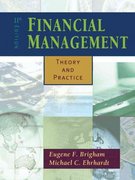a. From the stockholders' point of view, an increase in the personal income tax rate would make
Question:
a. From the stockholders' point of view, an increase in the personal income tax rate would make it more desirable for a firm to retain and reinvest earnings. Consequently, an increase in personal tax rates should lower the aggregate payout ratio.
b. If the depreciation allowances were raised, cash flows would increase. With higher cash flows, payout ratios would tend to increase. On the other hand, the change in tax-allowed depreciation charges would increase rates of return on investment, other things being equal, and this might stimulate investment, and consequently reduce payout ratios. On balance, it is likely that aggregate payout ratios would rise, and this has in fact been the case.
c. If interest rates were to increase, the increase would make retained earnings a relatively attractive way of financing new investment. Consequently, the payout ratio might be expected to decline. On the other hand, higher interest rates would cause \(r_{d}\), \(\mathrm{r}_{\mathrm{s}}\), and firm's MCCs to rise--that would mean that fewer projects would qualify for capital budgeting and the residual would increase (other things constant), hence the payout ratio might increase.
d. A permanent increase in profits would probably lead to an increase in dividends, but not necessarily to an increase in the payout ratio. If the aggregate profit increase were a cyclical increase that could be expected to be followed by a decline, then the payout ratio might fall, because firms do not generally raise dividends in response to a shortrun profit increase.
e. If investment opportunities for firms declined while cash inflows remained relatively constant, an increase would be expected in the payout ratio.
f. Dividends are currently paid out of after-tax dollars, and interest charges from beforetax dollars. Permission for firms to deduct dividends as they do interest charges would make dividends less costly to pay than before and would thus tend to increase the payout ratio.
g. This change would make capital gains less attractive and would lead to an increase in the payout ratio.
Step by Step Answer:

Financial Management Theory And Practice
ISBN: 9780324259681
11th Edition
Authors: Eugene F Brigham, Michael C Ehrhardt





